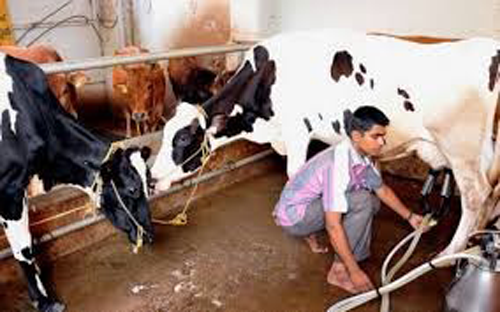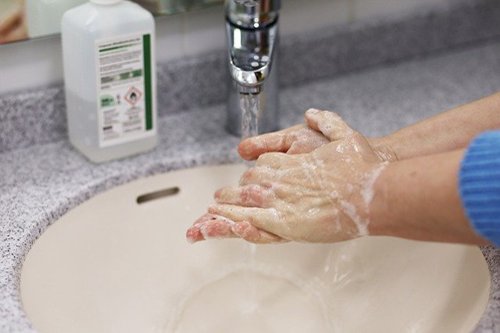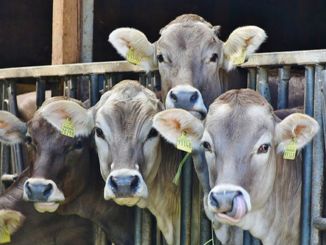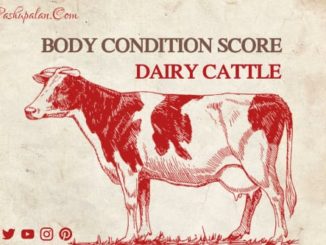The recent COVID-19 events and realities are unprecedented. We are truly seeing history being made which will have an effect on the dairy industry and society as a whole. The World Health Organization has classified the Covid-19 outbreak as a global pandemic because it is affecting countries all over the world. Individuals and organizations can fight coronavirus by taking steps to prevent its transmission, which will lower the infection rate and prevent health care systems from being overwhelmed. The spread of the virus has raised concerns about how it may affect public health as well as our economy, including dairy production. The global dairy sector is taking the impact of COVID-19 extremely seriously.

Dairy farms are 24-hour, 7-day per week business and operations must continue. Currently no vaccine is there to prevent this virus; following farm management considerations specific to dairy farm operations and workers can help stop human to human spread of this virus:
- Wash your hands often with soap and water for at least 20 seconds. If soap and water are not available, use an alcohol-based hand sanitizer that contains more than 60% alcohal. Keep all the areas of the dairy farm stocked with disinfectants and soap.

- Wash your hands before you eat after working in the milking parlor or other areas of the dairy.
- Access to the dairy farm by non-essential persons should be limited.
- A single entry/exit to the farm should be maintained continuously to control non-essential workers or visitors from gaining access to the farm.
- Avoid touching your eyes, nose and mouth with unwashed hands.
- Stay home when you are sick.
- Avoid close contact with people who are sick, both on and off the dairy.
- Cover your cough or sneeze with a tissue, then throw the tissue in the trash.
- Workers should wear appropriate Personal Protective Equipment.
- When you get home after working in the dairy, always take a shower and thoroughly wash your work clothes. Workers should know COVID-19 symptoms.
- Clean and disinfect frequently touched objects and surfaces.
- Social distancing should be practiced such as when there is a need to get supplies from a farm and feed store.
- Talk with your employees about coronavirus, how it spreads, and how to prevent getting infected.
- Provide guidance to help employees clean and disinfect housing.
- Print the CDC (Centers for Disease Control and Prevention) factsheets and posters, paste in your workplace and employee housing facilities.
- Clean and disinfect your workplace. Clean and disinfect any areas where employees congregate or routinely touch items such as doorknobs and computer keyboards.
- Set up daily and weekly cleaning schedules.
- Provide cleaning supplies such as cleaning solutions, buckets, mops, brushes, etc for cleaning at work and for those living in employer-provided housing.
- Farm tours should be suspended until such time as the human-to-human transmission risk has abated.
- Use teleconferences to talk with advisors who do not need to be on the farm such as nutritionist, banker/loan officer, extension personnel, etc.
- For dairy farms with retail stores on-site, operate in accordance with the recommendations of federal, state and local health officials.
- Communicate with employees that they should stay home if they are sick. Be sure your employees understand that their health and that of their co-workers’ comes first. Communicate and make a plan to cover for sick employees.
- Prepare your disaster contingency plan. What will you do if 50% of your employees become sick and unable to work?
- Consider talking with neighboring dairies about sharing workers if one dairy finds itself in a worker shortage crisis.
Farmers and their workers should follow the advice of the Ministry of Health with regard to keeping good hygiene standards, including washing hands, covering coughs and sneezes. Currently there is no evidence animals (pets or livestock) can spread COVID-19. It is unlikely that COVID-19 can be transmitted through food, and there isn’t evidence to date of this happening. Networks of farming colleagues and friends might be useful to talk through how you might support each other in different scenarios. Keep up to date with developments and advice from the Ministry of Health.






Well written and informative article that will help farming sector people to ensure safety measures in order to curtail spread of covid.
Highly informative article….very well written…being associated with veterinary medicine, we should work forward to prevent Corona virus infection among animals.it will be beneficial for farm animal population and people associated with farming as well.
We shall look forward for more informative pieces on different topics from you.
Warm regards
A well informed article for the primary sector of our country… Very nicely written.
Well articulated and enlightening the novel concept s dealing with COVID 19. Demonstrated excellent research skills and developed a critical understanding with viable solutions.
Overall outstanding contribution in the research.
Thanks and regards
Thanks and regards
Thanks
Thanks
Thanks
Very useful article, work more hard
Well articulated and in-depth solutions pertaining to COVID-19 crisis.
Regards!!
A very well written and informative article. Thank you Dr. Shelly
Regards
ASHWINI GOEL
Only management will be the vaccine for all of us either for human being or for animals. Round of blows for appreciation
It was an exceptionally well-written article and created many interesting suggestions on the subject.
I particularly liked the fact that it was an objective look at the issue, pointing out the present requirement of the dairy farmers.
Mam I would like to thank you for both a well researched and well-written article
Regards
An enlightening piece written lucidly for easy comprehension. Thanks for your efforts in writing and sharing this informative article.
All the best for your future endeavours,
With Esteemed Regards
Excellent article and will definitely protect the farm labour from COVID19 if they follow the instructions
Too good shelly. A novel thinking for farm labour for their prevention from covid.
Nicely written article.
Bravo.